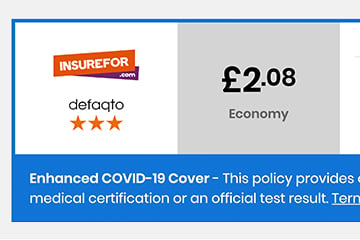"If you're pregnant, getting a travel insurance policy shouldn't be any harder than it was before you were expecting. But, some insurers may impose their own limits and restrictions. So, make sure you read the policy details carefully!"
Tips for travelling while pregnant
It's important to consult your doctor or midwife before travelling while pregnant to ensure you're taking proper precautions. But, here's some useful tips to help you prepare for a safe and comfortable trip.
-
Check that your doctor or midwife is happy for you to travel. They'll be able to confirm if it's safe for you to travel, and provide a fit note if needed. Just remember that travelling against this advice can void your travel insurance.
-
Check for any vaccinations or anti-malaria medication you might need. Some vaccines and medicines are unsafe to use during pregnancy. The NHS recommends non-live vaccines during pregnancy. But, in certain cases your GP or nurse can help weigh the benefits and risks of any necessary travel vaccines or medications.
-
Check your airline's guidelines. It's common for airlines to have restrictions on flying towards the end of your pregnancy. Flights can also increase the risk of deep-vein thrombosis (DVT), or blood clots in your legs or pelvis.
-
Check your cruise operator's guidelines. Most cruise operators won't let you aboard if you're more than 24 weeks pregnant.
-
Steer clear of locations that are high-risk for Zika virus. It can be especially harmful to pregnant people and their babies. If you're unsure about your destination, you can check the Travel Health Pro website.
-
Keep a copy of your medical notes with you. This includes maternity notes and information about any medications you're taking. If your GP has given you a fit-to-fly letter, you should also bring this.
We've put together a guide on travelling while pregnant where we take a deeper dive into some of our top tips.
What our travel insurance expert says
Compare travel insurance quotes
If you're pregnant and are looking for travel insurance, just follow these 3 steps. And remember - while pregnancy itself doesn't usually need to be declared, if you have any pregnancy-related conditions or complications, you need to declare them when we ask about medical conditions.
Fill out our quote form
We'll do the hard work
Choose your policy
Frequently asked questions
Do I need pregnancy travel insurance if I have a GHIC card?
Yes. Although carrying a Global Health Insurance Card (GHIC) or the European Health Insurance Card (EHIC) is recommended, they're not a replacement for travel insurance.
The GHIC and EHIC provide you with access to necessary state-level healthcare at the same price a local citizen would pay. That means healthcare isn't necessarily free. Travel insurance can cover these medical bills.
Travel insurance also covers much more than the GHIC and EHIC do. For example, it can offer baggage cover in case you lose your luggage. Or, if you need to cancel your holiday altogether, travel insurance often has cancellation cover. So, while you should still have a valid GHIC or EHIC, you should still consider buying travel insurance.
Is it safe to fly when pregnant?
Current NHS advice says flying is generally safe during pregnancy, as long as you take proper precautions.
If you have any doubts, it's worth speaking to your doctor or midwife. They can confirm whether you're safe to fly. They can also provide a fit note if needed.
What are the different types of travel insurance?
Travel insurance guides
Our service is free and compares a wide range of trusted household names. Confused.com is an intermediary and receives commission from theidol.com if you decide to buy through our website which is based on a percentage of the total annual premium. We pride ourselves on impartiality and independence – therefore we don't promote any one insurance provider over another.









